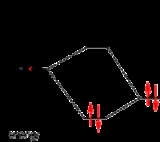
Lewis acid
Overview
The term Lewis acid refers to a definition of acid published by Gilbert N. Lewis
Gilbert N. Lewis
Gilbert Newton Lewis was an American physical chemist known for the discovery of the covalent bond , his purification of heavy water, his reformulation of chemical thermodynamics in a mathematically rigorous manner accessible to ordinary chemists, his theory of Lewis acids and...
in 1923, specifically: An acid substance is one which can employ a lone pair from another molecule in completing the stable group of one of its own atoms. Thus, H+ is a Lewis acid, since it can accept a lone pair
Lone pair
In chemistry, a lone pair is a valence electron pair without bonding or sharing with other atoms. They are found in the outermost electron shell of an atom, so lone pairs are a subset of a molecule's valence electrons...
, completing its stable form, which requires two electrons.
The modern-day definition of Lewis acid
Acid
An acid is a substance which reacts with a base. Commonly, acids can be identified as tasting sour, reacting with metals such as calcium, and bases like sodium carbonate. Aqueous acids have a pH of less than 7, where an acid of lower pH is typically stronger, and turn blue litmus paper red...
, as given by IUPAC is a molecular entity (and the corresponding chemical species) that is an electron-pair acceptor and therefore able to react with a Lewis base
Base (chemistry)
For the term in genetics, see base A base in chemistry is a substance that can accept hydrogen ions or more generally, donate electron pairs. A soluble base is referred to as an alkali if it contains and releases hydroxide ions quantitatively...
to form a Lewis adduct
Adduct
An adduct is a product of a direct addition of two or more distinct molecules, resulting in a single reaction product containing all atoms of all components. The resultant is considered a distinct molecular species...
, by sharing the electron pair furnished by the Lewis base. This definition is both more general and more specific—the electron pair need not be a lone pair (it could be the pair of electrons in a π bond, for example), but the reaction should give an adduct (and not just be a displacement reaction).
A Lewis base, then, is any species that donates a pair electrons to a Lewis acid to form a Lewis adduct.

